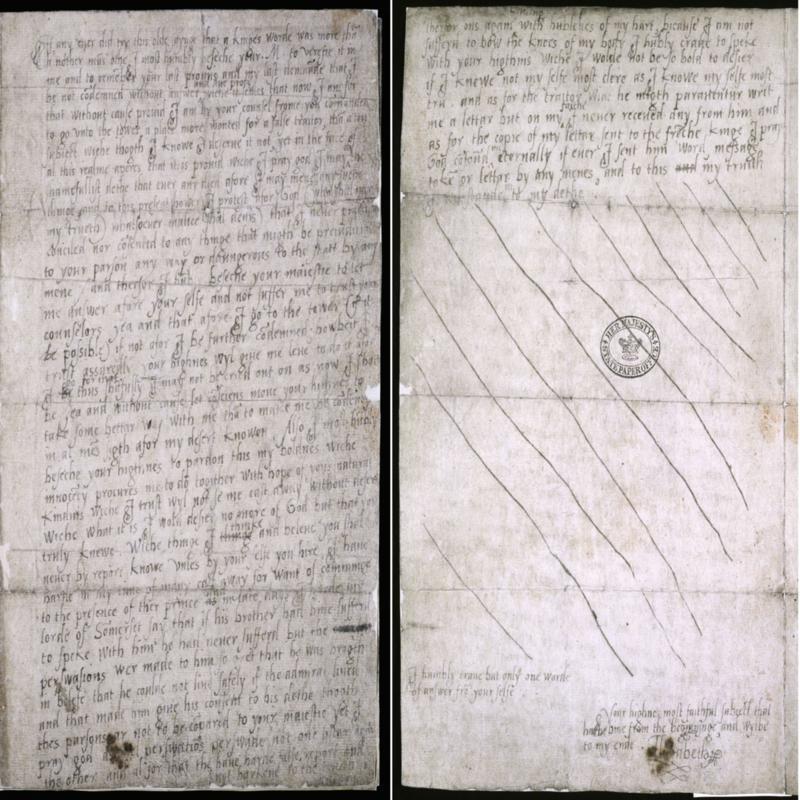Princess Elizabeth's Tide Letter
Posted on 4th February 2021
Written on 17 March 1554, at a moment of great danger the then Princess Elizabeth never put pen to paper with more at stake or over a more sustained period of time. She was suspected of involvement in the Wyatt Rebellion that had sought to depose her Catholic half-sister Mary and upon learning that she was to be taken to the Tower of London a charge of treason looming over her, Elizabeth wrote to her sister pleading for a private audience but beginning at noon she wrote slowly aware of the time when the tide of the River Thames turned preventing boats from navigating the narrow arches of London Bridge. By doing so she prevented her removal to the Tower for another day.
She was also aware that she had enemies at Court, none more so than Bishop Gardiner the man who would be responsible for her interrogation and had already advocated her execution. It is hardly surprising then that she struck through the space between the letter and her signature. She knew that it would be read before delivery and likely altered:

If any ever did try this old saying that a king’s word was more than another man’s oath I most humbly beseech your Majesty to verify it in me and to remember your last promise and my last demand that I be not condemned without answer and due proof which it seems that now I am for that without cause proved I am by your counsel from you commanded to go unto the Tower a place more wonted for a false traitor, than a true subject which though I know I deserve it not, yet in the face of all this realm appears that it is proved. which I pray God I may die the shame-fullest death that ever any died afore I may mean any such thing; and to this present however I protest before God (Who shall judge my truth, whatsoever malice shall devise) that I neither practiced, counseled nor consented to anything that might be prejudicial to your person in any way or dangerous to the State by any means. And therefore I humbly beseech your Majesty to let me answer afore yourself and not suffer me to trust your counselors yea and that afore I go to the tower (if it be possible) if not afore I be further condemned, how be it I trust assuredly your Highness will give me leave to do it afore I go, for that thus shamefully I may not be cried out on as now I shall be, yea and without cause. Let conscience move your Highness to take some better way with me than to make me be condemned in all men’s sight afore my desert known. Also, I most humbly beseech your highness to pardon this my boldness which innocence procures me to do together with hope of your natural kindness which I trust will not see me cast away without desert, which what it is I would desire no more of God but that you truly knew. Which things I think and believe you shall never by report know unless by yourself you hear. I have heard in my time of many cast away for want of coming to the presence of their Prince and in late days I heard my lord of Somerset say that if his brother had himself suffered to speak with him he had never suffered, but the persuasions were made to him so great that he was brought in belief that he could not live safely if the Admiral lived and that made him give his consent to his death. Though these persons are not to be compared to your Majesty, yet I pray god that evil persuasions persuade not one sister against the other and all for that they have heard false report and not harkened to the truth.
Therefore once again kneeling with humbleness of my heart, because I am not suffered to bow the knees of my body I humbly crave to speak with your Highness which I would not be so bold to desire if I knew not myself most clear as I know myself most true, and as for the traitor Wyatt he might peradventure write me a letter but on my faith I never received any from him and as for the copy of my letter sent to the French King I pray God confound me eternally if ever I sent him word, message, token or letter by any means, and to this my truth I will stand in to my death.
I humbly crave but only one word of answer from your-self.
Your Highness, most faithful subject that hath been from the beginning, and will be to my end, Elizabeth.
Share this post:





